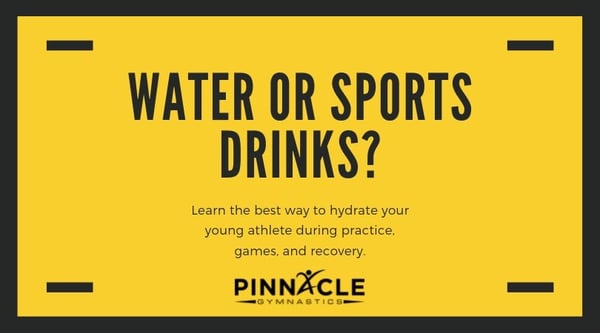The short answer is WATER!
But as in most things, it is more complicated than just an easy answer. Once you are thirsty, you are already at least 5% dehydrated. Don't let your athletes get to this point! It will slow them down, wear them out, and possibly be life-threatening.

Even NFL athletes with athletic trainers at their side have died from the summer heat - all they needed was more water! Thirty to sixty minutes before practice, drink several 8 ounces glasses of water. How much is enough? Until you urinate before the competition and the color is light yellow and odorless - that is the best test that you are hydrated. (You asked!) No matter what... let your athletes drink! Make it convenient so practice is not interrupted and it is not used for an excuse from something the athlete may wish to avoid.
What About Sports Drinks?
These drinks have electrolytes and sugar. It will increase carbohydrates lost during heavy aerobic exercise while still replenishing fluids. It also will make the gut work slightly harder processing that extra stuff and may even cause, in some athletes, nausea, stomach ache, or diarrhea- not the best during a competition! During a practice or competition lasting one hour, I recommend drinking water. If the competition lasts over an hour - or you have several games the same day - drink water the first hour and then switch to a sports drink to help replenish sugars and electrolytes. Regardless of the choice of drink - approximately 6-8 ounces every ten to twenty minutes is best - less for anaerobic sports like gymnastics and more during high sweat activities such as a soccer game in the summer heat. A sports drink to replenish carbohydrates and fluid at the end of any length workout is fine.
What About Supplement Drinks and Energy drinks?
Drinks with extra protein or extra carbohydrates may or may not be beneficial depending on your goals such as gaining weight, increasing endurance, etc.
Drinks with high amounts of caffeine, taurine, boost supplements, or hormones are never appropriate and may be dangerous, including increased heart rates, diuretic effects (risking dehydration), and other potentially unhealthy risks. There are rare reports of death associated with energy drinks possibly from ingesting more than the recommended amount, consuming with alcohol, or while dehydrated.
Coaches and parents need to be responsible in educating young athletes on not only what is ethical in sport, but also what is safe. Energy drinks ARE NOT SAFE!
One of my favorite after exercise recovery drinks is chocolate milk or a small chocolate milk shake followed by water. Chocolate milk has carbs, protein, and fat and tastes good too! Obviously lactose intolerant and some food allergies can’t have milk, every athlete is different - but for most this is a good recovery drink. It isn’t a great pre-workout drink though - milk may take a bit more to digest than water and could make the athlete sick to their stomach - not a great goal before the competition!
Board Certified Pediatrician with an interest in Sports Medicine
Concussion Management Team
Team Medicine




